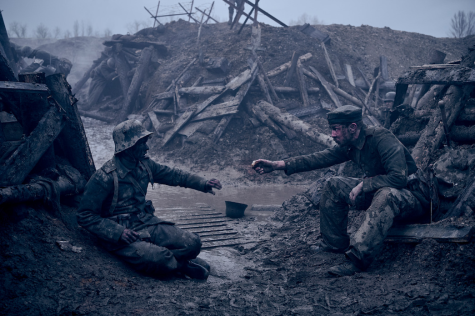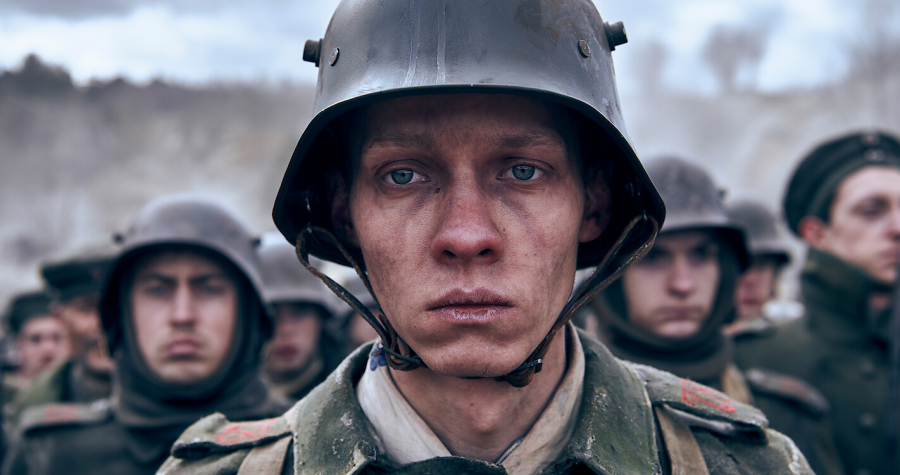All Quiet on the Western Front: A harsh wake-up call
Paul Bäumer, played by Felix Kammerer, blankly stares into the distance, permanently scarred by the battlefield. This scene is one of many that, unlike other films, expose the deep carnage and brutality of warfare — “All Quiet on the Western Front” has received several Oscar nominations and awards, capturing the importance of accurate war representation.
War is a game. Or at least, based on the way it’s been shown on-screen in recent years, it sure seems that way. “All Quiet on the Western Front,” in all its grisly imagery, challenges these conventions, setting an unprecedented standard as a film that expresses anti-war sentiments in a shockingly bold way.
The film follows the experience of a naive young soldier, Paul Bäumer, gradually discovering the grim reality of war as he loses comrades, hope and eventually, humanity. Through Paul, “All Quiet on the Western Front” takes on traditional anti-war portrayals and turns them on their head, challenging the film industry’s depiction of war and its perception by society.
The film has garnered unexpected attention and critical review since its release in September 2022. Directed by German filmmaker Edward Berger, its four Oscar Awards, nine nominations and a record-breaking seven wins in the BAFTA Awards prove that it far exceeded already-high expectations.
In an era of media saturated with violence, “All Quiet” has broken through the mundane with a phenomenal edge. Although the world was torn by two world wars just a little over a century ago, conflict no longer holds the same weight as it once did. Long gone is the horror of conflict and violence — in its place is a glorified perception of war, which reduces conflict to nothing more than pure entertainment. As portrayals of violence become more normalized, a disturbing reality has approached: desensitization to violence.
In all its visceral brutality, “All Quiet” brings a novel, much-needed medium of war representation to the forefront of media by defying norms surrounding violence and capturing viewers in the raw realities of conflict.
In particular, the film’s seemingly repetitive string of battles stands out as a unique yet effective production choice in pushing a feeling of never-ending carnage. Over and over again, the dying cast is battered with barrages of gunfire and bombs. The film’s stunning visuals gradually become hard to even look at as viewers realize that there’s no reprieve from the constant sound of gunfire ringing in their ears.
“Sometimes you need to be able to turn away from a movie, to be repulsed by it,” Berger said in an interview with Deadline. “I don’t want you to watch the whole movie and just go, ‘OK.’ You need to be physically attacked by the violence. You need to feel the impact of the violence. To me, it’s important to keep you there and not let you go.”
Beyond the sheer brutality of the film, it’s interlaced with subtler psychological themes. Today, Hollywood tends to struggle with portraying war as more than simply death. Anti-war movies blindly grasp the concept of violence, yet fail to acknowledge the deeply damaging mental effects of it — the newfound challenge in loyalty toward the state. In stark contrast, “All Quiet” unabashedly confronts the disillusioning phenomenon of nationalism, exploring the realities of war and how soldiers on the battlefront deal with this realization.
On-screen, Paul’s romantic dreams of patriotism are instantly shattered as he finds that the glorious battle he’d been told of all his life is nowhere in sight. Instead, he’s met with pure horror and ugly reality, surrounded by soldiers with similarly dying visions. His experiences shed light on a tragic realization: that he and millions of others are nothing but cannon fodder to the country they gave their lives to.
“There’s a story that you can tell of heroism, and there’s a sense of pride in your country and honor about what happened — but there’s nothing like that in Germany,” Berger said in an interview with the Gold Derby. “There’s only shame, guilt and horror. That just gives a very different perspective and a very different feeling to it.”
With the release of “All Quiet,” it becomes clear that war cannot simply be portrayed on a spectrum of bloodshed. The film firmly takes its stance as a piece of anti-war media that genuinely aims to expose the nuances of conflict beyond loss, staying true to the experiences of soldiers in WWI.
“All Quiet” touches on the universally true message of loss of individualism during war in a pragmatic way. From the name tags of the dead being tossed into towering mounds to thousands of fighting soldiers looking monochrome in a sea of blood, no one seems to hold individual value — even Paul. To Paul and the audience that follows his story, a comrade’s death is emotionally traumatizing. Yet to the military officers pushing him along, to the French, he is fighting and in the grand scheme of things, it matters so little.

“It’s just as brutal as it needs to be,” Paul’s actor Felix Kammerer said in an interview with The Face. “If you do a movie about WWI and you are not showing atrocities, you’re just not being true to history. It’s like propaganda the other way around. You’re showing war as a game. To really show what war is, you need to show people die — how they die.”
Their grim yet quiet deaths emphasize the futility of war. There is no “lone hero” that will be remembered, no memorial that can commemorate the millions lost in WWI without trivializing their deaths to numbers alone. Rather, only a quiet stillness remains.
At the end of the day, “All Quiet” forces us to embrace the harsh realities of what war really means for those involved, revealing its horrors to a numb generation. The deeply profound portrayal marks a significant milestone toward cultural awareness of how war should be looked back upon.




